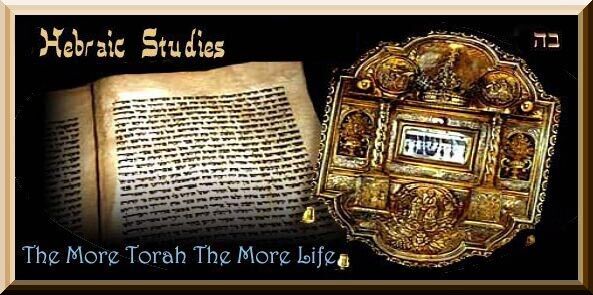Hebraic Studies – Parashat Bereshit
Please Note: Firefox and
some other search engines are not suitable
Use Google Chrome for this page to load perfectly!

Please
do NOT
visit this site on Shabbat or on a
![]() -
Y-H-V-H, which we usually pronounce as “Adonai” or “HaShem”.
-
Y-H-V-H, which we usually pronounce as “Adonai” or “HaShem”.
*“This is My Name forever,
and this is My memorial to all generations.”
Shemot - Exodus 3:15.
Although some minor alterations have been made relating to names and attributes having been corrected.
Please Note: Verse numbers may at times vary in non-Jewish Bibles.
Bereshit - Genesis Chapter 1 verse 1 to Chapter 5 verse 32.
With Rabbi Reuven
Ben-Avraham.
The Torah
tells us that Elohim completed His creation on the seventh day, and He then
rested on what has become the, and our blessed “Shabbat”.
Thus did
Elohim, blessed be He, create anything on Shabbat? And what does really mean when
it states “And on the seventh day Elohim finished His work”. Should
it not have said that He completed His work on the sixth day? The
question is how can we address this issue. “What
was the world lacking on or for the seventh day Shabbat came it was “menucha”, and when that
came then the work was completed and finished.
The truth is
that ![]() Elohim, blessed be His Sanctified Name, did
indeed create something on or for the Shabbat, and that was the concept of “menucha” (rest, peace and quiet)
Elohim, blessed be His Sanctified Name, did
indeed create something on or for the Shabbat, and that was the concept of “menucha” (rest, peace and quiet) ![]() .
.
This teaches
us an important point, one may have thought that the concept of
‘rest’ is as a passive mode of behaviour, and not something that
needs to be created, however, we see from this that the Torah’s concept
of ‘menucha’ is something that Elohim created by refraining from
regular ‘melacha’ (work or creating).
Accordingly, Elohim’s rest was not merely refraining from creative
activity; rather it also involved a cessation of activity that
‘enabled’ Him to, so to speak, to reflect and to appreciate the
fruits of the incredible activity of the previous six days.
As we know, by
‘resting’ on Shabbos we emulate
Elohim’s original ‘rest’.
We should learn that the ‘Shabbat
menucha’ (Sabbath rest)
that we are required to participate in does not simply mean that we should not
do any melacha
(work), rather it requires an active
effort. What does this active effort involve? Just like Elohim stepped back and
reflected upon all His work of the previous six days, so too we are supposed to
actively contemplate our achievements of the previous six days and appreciate
what we have achieved spiritually, have we done all we should have. Did we keep
Kosher, Say our daily prayers, and Say the blessing before and after our meals,
and lit the Shabbat candles, etc, etc? Thus an important aspect of Shabbat is
contemplation of where we are going in life which should enable us to enter the
next week as growing individual’s, and hopefully encouraging our mishpachot to do the same and Elohim willing join you at
Shul!
Shabbat Shalom,
Always
remember our motto seen on the logo at the top of this page: “The More Torah, the More
Life”, for
![]() Elohim, blessed be His Sanctified Name, is the
one who gave us our Life!”
Elohim, blessed be His Sanctified Name, is the
one who gave us our Life!”
![]()
Return to our MAIN PAGE or go to our Main Index


